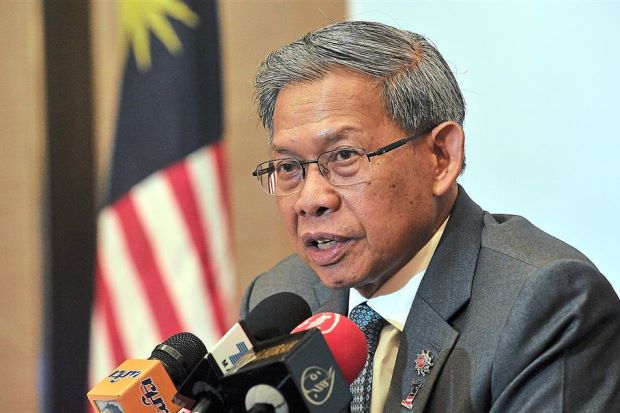Malaysia will not sign any TPP pact in Hawaii

The Sun | 30 Jul 2015
Malaysia will not sign any TPP pact in Hawaii
PETALING JAYA: As pivotal negotiations in the making or breaking of the Trans-Pacific Partnership (TPP) enter the final stretch, the Ministry of International Trade and Industry (Miti) has stated that Malaysia will not sign any agreement during the current round of talks, which runs until July 31, and sought to reassure critics that it will stand firm on issues of sovereignty, government procurement, state-owned enterprises and the bumiputra agenda.
The latest TPP Ministerial Meeting began on Tuesday in Hawaii, USA.
"Signing of the TPPA (Trans-Pacific Partnership Agreement) will not happen in Hawaii. Like Malaysia, each TPPA member will need to go through its own domestic process before a final decision to sign and ratify the TPPA is made," Minister Datuk Seri Mustapa Mohamed said in a statement released yesterday.
"I wish to emphasise that as the Minister-in-charge of the TPPA negotiations for Malaysia, it is my responsibility to ensure that our Constitution, sovereignty and core policies of the nation, including the interests of the Bumiputera community are safeguarded and upheld," said, adding that the meeting is also to ensure that the country’s interests and concerns are addressed.
In acknowledging criticism against the ongoing TPPA negotiations, Mustapa also addressed known concerns on the inclusion of the Investor-State Dispute Settlement (ISDS) mechanism, government procurement, capital controls, medicines, market access, position of Islam as the official religion of Malaysia and the secrecy of the negotiations.
On the ISDS, he said the TPPA does not prevent governments from pursuing and regulating legitimate public policy objectives, especially in areas such as national security, public health environment and welfare and that a number of safeguards are being negotiated to address key concerns, including the avoidance of frivolous challenges by investors.
On government procurement, Malaysia is looking at ensuring that the current Bumiputera and SME preferences will be maintained.
On capital controls, the statement said that Malaysia and other like-minded countries have successfully defended the rights to ensure that there will be sufficient policy space to mitigate any destabilizing effect of capital flows and preserve financial and macroeconomic stability.
On the impact of patent protection laws on the prices of medication, Mustapa said the government has taken a stand to balance the access to drugs with incentives for new drugs to be produced and brought into the market in an effort to ensure access to affordable drugs.
"As in all negotiations, there are concessions that need to be made. But the government has taken a firm stand in the TPPA: our Constitution, sovereignty, and core policies such as government procurement, state-owned enterprises and the Bumiputera agenda will be safeguarded."
"Ultimately, the final document together with the two cost-and-benefit analyses will be presented to the public and Parliament. The decision whether to sign or reject TPPA will be a collective Malaysian decision," he concluded.
Mustapa also said that it is not the intention of the government to keep the negotiating text a secret, and that in the event that an agreement is reached, the Malaysian public will have access to the full text and as promised, the Parliament will deliberate and make a decision on Malaysia’s participation in the TPP.
The negotiating team that Mustapa will lead, comprises experts from over 20 ministries and agencies, including Bank Negara Malaysia, Ministry of Finance, Ministry of Human Resources, Ministry of Natural Resources and Environment, Ministry of Agriculture and Ministry of Domestic Trade, Consumerism and Cooperatives.
The team will be assisted by legal officials from the Attorney General’s Chambers, adding the positions taken by the officials on issues negotiated in the TPP are also based on feedback received from various stakeholders.
– The Sun Daily





